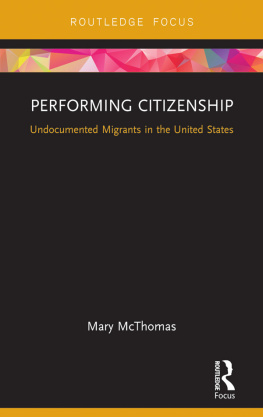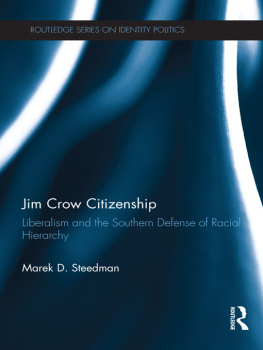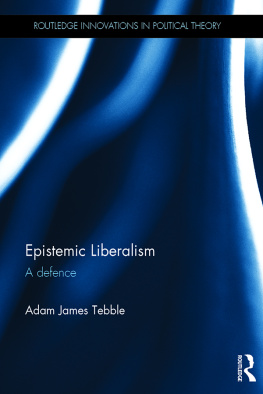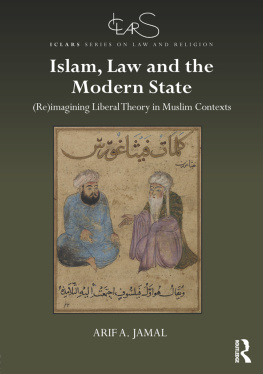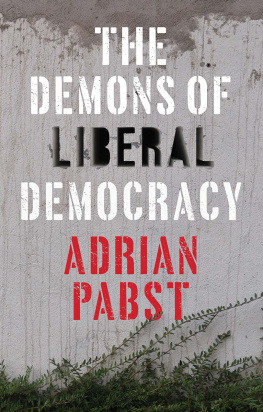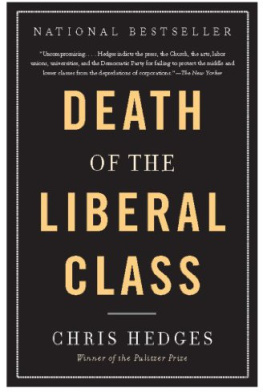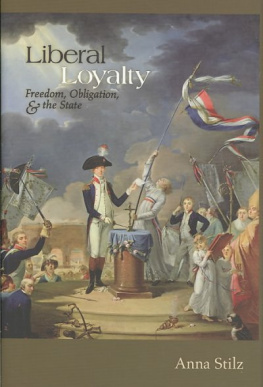
Liberal Loyalty

Liberal Loyalty
Freedom, Obligation, and the State
Anna Stilz

Copyright 2009 by Princeton University Press
Published by Princeton University Press, 41 William Street,
Princeton, New Jersey 08540
In the United Kingdom: Princeton University Press, 6 Oxford Street,
Woodstock, Oxfordshire OX20 1TW
All Rights Reserved
Stilz, Anna, 1976
Liberal loyalty : freedom, obligation, and the state / Anna Stilz.
p. cm.
Includes bibliographical references and index.
ISBN 978-0-691-13914-2 (hadcover : alk. paper) 1. Citizenship. 2. Justice. 3.
Liberalism. I. Title
JF801.S74 2009
323.6dc22 2008040053
British Library Cataloging-in-Publication Data is available
This book has been composed in Sabon
Printed on acid-free paper.
press.princeton.edu
Printed in the United States of America
10 9 8 7 6 5 4 3 2 1
Contents
Preface
This book is called Liberal LOYALTY because it offers a defense of loyal or committed citizenship. It is not an argument in favor of supererogatory displays of patriotismdying for ones countrynor for political loyalty at all costsmy country right or wrong. Instead, it defends loyal citizenship in a more restrained, everyday sense: obeying the law, paying ones taxes, voting and participating politically, and showing a special concern for the equality and well-being of ones compatriots. It argues that we have important political obligations, and that we should take them seriously.
The book is called LIBERAL Loyalty, on the other hand, because it claims that the reason we should be loyal citizensthe reason we should take our political obligations seriouslyis simply that we care about liberal justice, and not that we share a national identity, are especially patriotic, or cherish a sentimental attachment to our state. An appeal to rationalist and universal principles, I argue, is sufficient to establish the importance of committed citizenship, and it provides a more normatively attractive basis for defending citizenship than do other views. Many people, of course, already believe that committed citizenship is important. I fear, though, that those who are already loyal citizens may not be so for the right reasonsthat is, for liberal reasons, and not patriotic or nationalist ones. And I also fear that liberals are increasingly drawn to question the value of loyal citizenship in favor of a more cosmopolitan vision. On both fronts, then, there is something to be said.
This book has been several years in the making, and in the process, I have accumulated debts to friends and colleagues that I cannot hope to properly repay. The book developed out of a dissertation that was written in Harvard Universitys Department of Government under the supervision of Richard Tuck. For his restrained guidance and penetrating criticismsand even more for providing me the model of a truly gracious intellectual lifeI am very grateful. Both Nancy Rosenblum and Sharon Krause read the whole manuscript carefully and provided comments and support at many crucial points. Several of the early chapter drafts were written in the year I spent as a graduate fellow at the Center for Ethics at Harvard University under the guidance of Michael Blake. His criticisms and his philosophical acumen have improved my work immeasurably.
Special thanks must also go to the many friends and colleagues who read versions of the manuscript. First, I must thank Verity Smith, Noah Dauber, and Bruno Macaesmy writing partners in the final summer of graduate schoolfor comments on the first full draft and for making the process of finishing the dissertation actually an enjoyable one! Joshua Dienstag also read an early version of the manuscript and gave very helpful comments, and has provided encouragement since my early days as an undergraduate at the University of Virginia. Special thanks as well to Melissa Schwartzberg, Bryan Garsten, and Karuna Mantenamembers of a writing group formed in my first year as an assistant professorwho read a much revised version in the summer of 2007, and who have provided just the right combination of sympathetic support and critical questions as the final version of the project took shape. Last, I must express my gratitude to Daniel Viehoff and Martin Sandbu, both of whom read large parts of the manuscript at a late date and helped me to clarify crucial parts of the argument.
I was fortunate to be able to produce the final version of the manuscript in the welcoming environment of the Department of Political Science at Columbia University, where my colleagues provided both intellectual stimulation and warm friendship. I also enjoyed the benefit of a postdoctoral fellowship year at the Berlin Program for Advanced German and European Studies, as well as the support of the Center for European Studies at Harvard University. Finally, portions of the project have been presented at various points along the way to audiences at the political science departments of Columbia University, Dartmouth College, Harvard University, Georgetown University, and Princeton University; to New York Universitys Monday Group; to the Berlin Programs Fellows Colloquium; to the graduate fellows seminar at Harvards Center for Ethics; and at meetings of the New England Political Science Association and the American Political Science Association. I learned much from the comments and questions offered by audience members at each of these presentations.
In addition, I must thank all those people who read parts of the manuscript over the last few years, or who engaged in important conversations and exchanges with me about these issues: Bob Amdur, Charles Beitz, Michael Bratman, Jean Cohen, Jon Elster, John Ferejohn, Eviana Hartman, Istvan Hont, David Johnston, Ira Katznelson, Dimitri Landa, Helene Landemore, Reidar Maliks, Patchen Markell, Jan-Werner Mueller, Isaac Nakhimovsky, Amalia Navarro, Japa Palikkathayil, John Parrish, Pasquale Pasquino, Alan Patten, Philip Pettit, Thomas Pogge, Simon Rippon, Andrew Sabl, Andrea Sangiovanni, Nadia Urbinati, and Tim Wali-gore. Their criticisms and thoughts all affected the evolution of the manuscript at crucial stages.
My first tentative thoughts about this project were born among an inimitable group of friends in Cambridge, Massachusetts, none of whom are responsible in any way for what is said hereand who usually did the best they could to help me forget about itbut whose companionship and support have contributed immeasurably to it nonetheless. I must thank the original inhabitants of 6 Marie AvenueCasey Klofstad, Will Phelan, and Ros Rickabyfor memories and companionship I shall cherish for many years to come. I owe thanks to countless other friends I have met along the way, but these three deserve pride of place.
Finally, I must end by expressing my debts of gratitude to those people who are most special to me: my family. To my mom, my dad, Pam, Coley and John Paul, I owe the strength and the support to complete a project like this one, and I am grateful for the love that they never fail to express. Without them, I would have given up long ago. To Hillel Soifer I owe more than I can fully say. He has been with me every step of the way.
PART ONE
Next page

